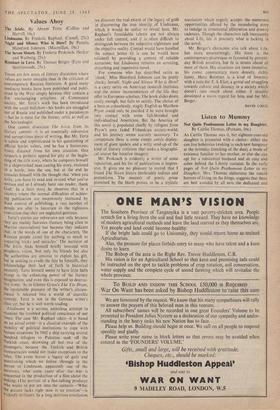Values Ahoy
Lindmann. By Frederic Raphael. (Cassell, 25s.) Night and Silence Who is Here? By Pamela The Seven Sisters. By Frederic Prokosch. (Seeker and Warburg, 25s.)
THERE are few areas of literary discussion where values are more unstable than in the criticism of contemporary Russian literature. A good many mediocre books have been published and publi- cised in the West simply because they contain a few encouraging criticisms of Communist society. Mr. Tertz's work has been introduced with the usual ballyhoo—his books are smuggled out of Russia and published under a pseudonym --but he is meat for the literary critic as Well as the Sov ietologist.
One cannot dissociate The Icicle from its literary context—it is an essentially subverSive and surreptitious piece of writing. But Mr. Tertz is subtle and sophisticated in his questioning of official Soviet values, and he has a humorous, ironic distance from his own situation. One suspects a pathetic appeal for pity at the begin- ning of the title story, where he compares himself to a shipwrecked man casting his story, enclosed in a bottle, into the sea; but at the end he consoles himself with the thought that 'when you Write, you have to read and re-read what you've written and so I already have one reader, thank God.' In a later story he observes that in a country where the normal difficulties of achiev- ing publication are enormously increased by State control of publishing, a vast number of People are able to luxuriate in the righteous conviction that they are neglected geniuses.
Tertz's stories are subVersive not only because they are mainly fantasies (fantasy being alien to Marxist materialism) but because they indicate that, in the words of one of the characters, 'the Russian people cared for nothing so much as conjuring tricks and miracles.' The narrator of The icicle finds himself briefly invested with Prophetic vision. Not only his friends but also the authorities are anxious to exploit his gift, but in seeking to evade the fate he foretells, they acknowledge their lack of faith in historical necessity. Tertz himself seems to have little faith except in the enhancing power of the literary imagination, and even this is exposed to destruc- tive irony. As in Gunter Grass's The Tin Drum, the intolerable pressure of the writer's circum- stance is released into a world of anarchic comedy. Tertz is not in the German writer's class yet, but he is well worth reading.
Lindmann is a serious, ambitious attempt to examine the troubled political conscience of our times. The case Mr. Raphael takes—it is based on an actual event—is a classical example of the inability of political institutions to cope with human situations. in 1942 a ship carrying several hundred refugees to Palestine sank off the Turkish coast, drowning all but two of the Passengers, because the Turkish and British bureaucracies would not make exceptions to the rules. The event leaves a legacy of guilt and questioning which we follow through in the Person of Lindmann, apparently one of the survivors, who some years after the , war is concerned in the production of a film about the Sinking. (The portrait of a fast-talking producer ‘‘'ho wants to put sex into the scenario—'What the picture lacks right now is an erection"-----is wickedly brilliant). In a long delirious conclusion we discover the real extent of the legacy of guilt in discovering the true identity of Lindmann, which it would be unfair to reveal here. Mr. Raphael's formidable talents are not always under full control, and it is often difficult to distinguish between the subjective nightmare and the objective reality. Conrad would have handled the subject better (it is one he would have relished) by providing a context of reliable narration; but Lindmann remains an arresting, disturbing and impressive novel.
For someone who has described satire as `cheek,' Miss Hansford Johnson can be pretty cheeky herself. Night and Silence Who is Here? is a catty satire on American research institutes and the minor inconveniences of the life they offer to European scholars. The hook slides down easily enough, but fails to satisfy. The choice of a hero as colourlessly, stagily English as Matthew Pryor could only be justified if he were brought into contact with some full-blooded and individualised Americans. But the America of this novel is populated chiefly by refugees from Pryor's own faded Firbankian society-world, and his journey seems scarcely necessary. To compensate there is some creepy comic deploy- ment of giant spiders and a witty send-up of the kind of literary criticism that seeks a biographi- cal source for iterative imagery.
Mr. Prokosch is evidently a writer of some reputation, and his list of publications is impres- sive. It gives me no pleasure to record that I found The Seven Sisters intolerably tedious and pretentious. The mastery of poetic prose promised by the blurb proves to be a stylistic
narcissism which eagerly accepts the numerous opportunities offered by the meandering story to indulge in ornamental alliteration and drowsy cadences. Though the characters talk incessantly about Life, life is precisely what is lacking in the novel.
Mr. Berger's characters also talk about Life, but more entertainingly. His form is the contemporary-picaresque so favoured by present- day British novelists, but he is streets ahead of most of them. His situations are more inventive,. his comic commentary more densely, richly funny. Hero Reinhart is a kind of Sweeney with a taste for T. S. Eliot, a genial oaf struggling towards culture and decency in a society which doesn't care much about either. I steadily developed a warm regard for him, and for Mr. Berger.-
DAVID LODGE






























 Previous page
Previous page